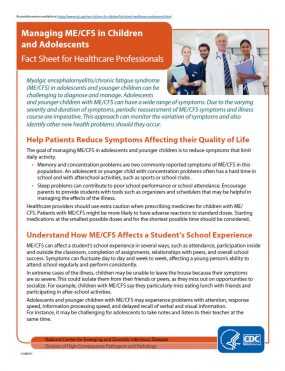Pediatric ME/CFS: Fact Sheet for Healthcare Professionals
Myalgic encephalomyelitis/chronic fatigue syndrome (ME/CFS) in adolescents and younger children can be difficult to diagnose and manage. This fact sheet offers information intended for healthcare professionals, including physicians, nurses, and nurse practitioners. on topics such as helping patients reduce symptoms, understanding how ME/CFS affects adolescents or younger children in school, and communicating with schools.
Managing ME/CFS in Children and Adolescents
Myalgic encephalomyelitis/chronic fatigue syndrome (ME/CFS) in adolescents and younger children can be challenging to diagnose and manage. Adolescents and younger children with ME/CFS can have a wide range of symptoms. Due to the varying severity and duration of symptoms, periodic reassessment of ME/CFS symptoms and illness course are imperative. This approach can monitor the variation of symptoms and also identify other new health problems should they occur.
Help Patients Reduce Symptoms Affecting their Quality of Life
The goal of managing ME/CFS in adolescents and younger children is to reduce symptoms that limit daily activity. Memory and concentration problems are two commonly reported symptoms of ME/CFS in this population. An adolescent or younger child with concentration problems often has a hard time in school and with afterschool activities, such as sports or school clubs. Sleep problems can contribute to poor school performance or school attendance. Encourage parents to provide students with tools such as organizers and schedulers that may be helpful in managing the effects of the illness.
Healthcare providers should use extra caution when prescribing medicines for children with ME/CFS. Patients with ME/CFS might be more likely to have adverse reactions to standard doses. Starting medications at the smallest possible doses and for the shortest possible time should be considered.
Understand How ME/CFS Affects a Student’s School Experience
ME/CFS can affect a student’s school experience in several ways, such as attendance, participation inside and outside the classroom, completion of assignments, relationships with peers, and overall school success. Symptoms can fluctuate day to day and week to week, affecting a young person’s ability to attend school regularly and perform consistently.
In extreme cases of the illness, children may be unable to leave the house because their symptoms are so severe. This could isolate them from their friends or peers, as they miss out on opportunities to socialize. For example, children with ME/CFS say they particularly miss eating lunch with friends and participating in after-school activities.
Adolescents and younger children with ME/CFS may experience problems with attention, response speed, information processing speed, and delayed recall of verbal and visual information. For instance, it may be challenging for adolescents to take notes and listen to their teacher at the same time.
Understanding the problems experienced by ME/CFS patients is helpful for clinicians who care for children and adolescents with ME/CFS and for teachers who teach these students. Clinicians, parents, and educators can work together to ensure an adolescent or younger child suffering from ME/CFS has access to educational support resources.
Communicate Effectively with Schools
ME/CFS is a complex illness, and the severity of the illness can differ from person to person. Letters from clinicians may provide support to students with ME/CFS and their parents in finding services to help them at school. When communicating with schools at the request of a parent/guardian, clinicians may describe the possible or confirmed diagnosis with particular emphasis on symptoms that can affect school performance and attendance.
It is important for clinicians to keep the Health Insurance Portability and Accountability Act (HIPAA), Family Educational Rights and Privacy Act (FERPA), and patient confidentiality in mind at all times.
Sample Information to Include in Healthcare Provider Letter
- Document suspected or confirmed diagnosis of ME/CFS and description of symptoms the patient is experiencing
- List support potentially needed for the child and the family in their experience of the illness, including its unpredictable symptoms
- Provide examples of how ME/CFS can affect activities of daily life and educational performance:
- This can include a decrease in energy levels, focus, and alertness, which might impact a child’s performance at school.
- Explain how extra educational support can help the child attain their learning objectives:
- This can include testing accommodations, homework modifications, limiting physical activity, splitting time between school and home tutoring, and permission to have fluids and salty snacks available, if needed.
- Page last reviewed: July 3, 2017
- Page last updated: October 10, 2017
- Content source:


 ShareCompartir
ShareCompartir
